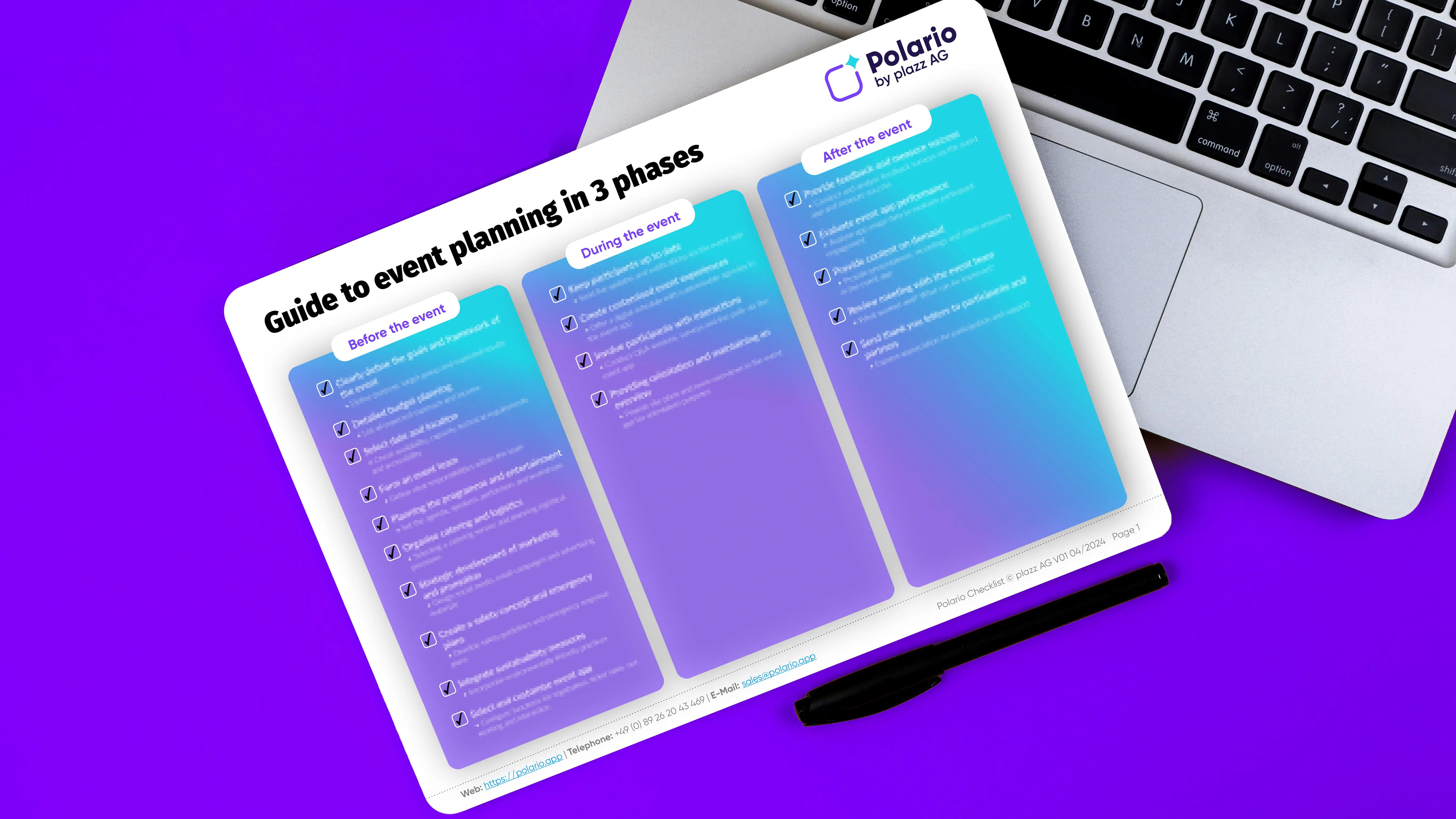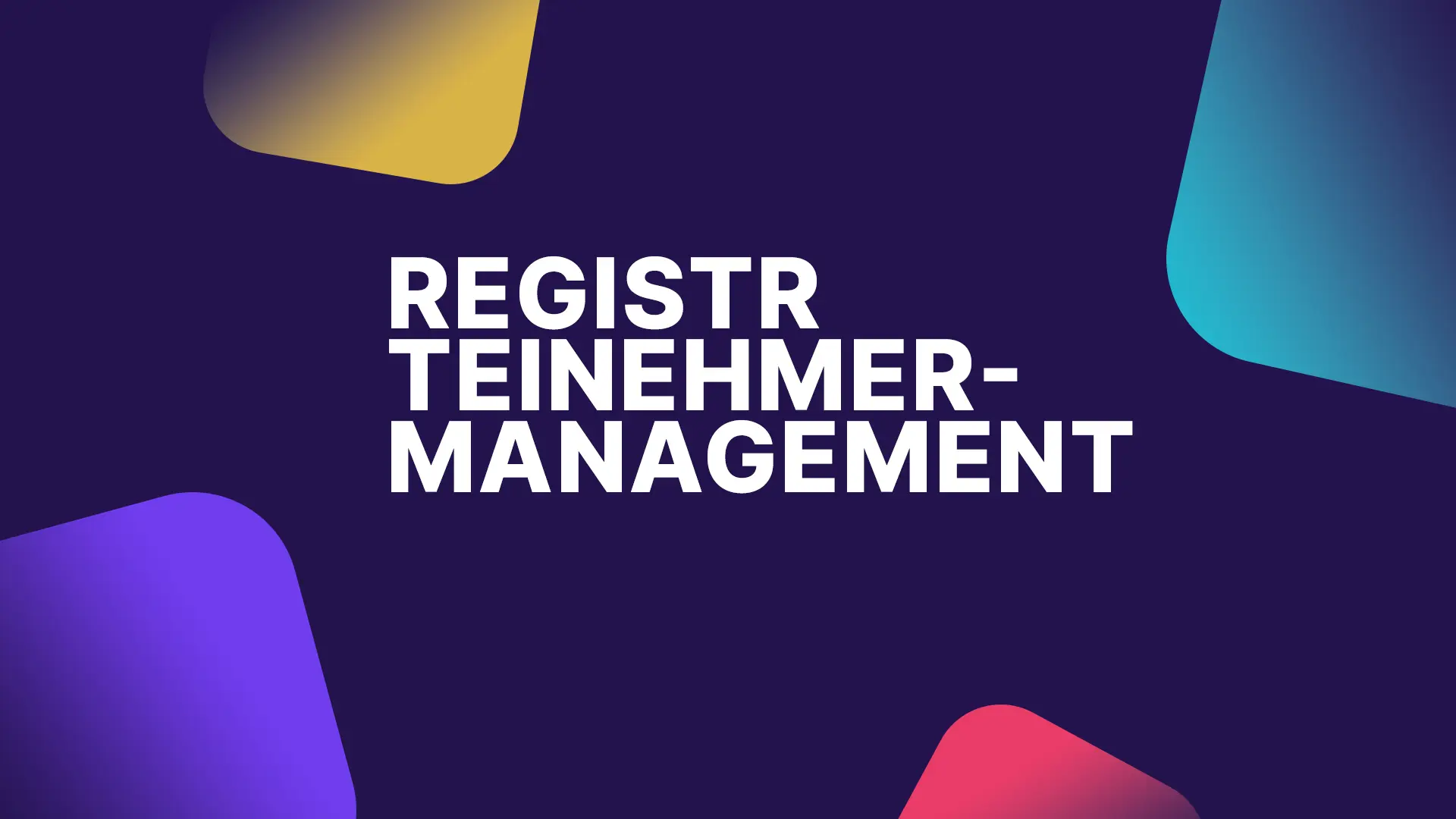Event planning is much more than just organizing a date or selecting a location. It involves the strategic design of processes, the coordination of numerous service providers, and the precise coordination of all communication and logistics processes. Whether it’s an employee event, a specialist conference, or a hybrid event, successful planning requires structure, foresight, and efficient tools.
Especially in companies where events are a central component of the brand and communication strategy, efficient event planning is crucial for quality, participant satisfaction, and budget compliance. Defining clear goals from the outset, using digital systems, and clearly assigning responsibilities creates a stable foundation for professional results.
In this article, you will learn 10 practical tips for efficient event planning that will help you optimize your processes, avoid bottlenecks, and successfully implement your events—in a way that is predictable, measurable, and has a lasting impact.
1️⃣ Clear goal definition and target group analysis
The first step in any successful event planning is to define a clear goal. Think about what you want to achieve with the event. Do you want to attract new customers, motivate employees, or increase brand awareness?
Only when you know exactly what your goal is can you tailor all other measures to it—from choosing the format to communication.
Analyzing your target audience is just as important. What are the participants’ expectations, interests, and needs? Which communication channels do they prefer to use? A precise target group analysis ensures that content, formats, and messages reach their intended audience.
2️⃣ Create a realistic budget and schedule
Structured budget management is the basis of efficient event planning. Calculate all items—from location and technology to personnel and catering—as early as possible.
Work with a transparent cost structure that also includes a buffer for unforeseen expenses. This will allow you to maintain financial control and avoid unpleasant surprises.
It is equally important to have a detailed schedule that covers all project phases: preparation, implementation, and follow-up. Use digital tools or project management software to clearly display deadlines, tasks, and responsibilities.
3️⃣ Use professional event management software
Anyone who still organizes events manually using Excel and email is wasting valuable time. Modern event management software offers centralized solutions for planning, participant management, communication, and reporting.
Such tools enable automated workflows, reduce errors, and facilitate teamwork. Especially for large corporate events or hybrid events, software ensures clear structures and less stress.
📢 Try our event management platform now for free and experience how digital planning can revolutionize your processes!
4️⃣ Ensure efficient communication within the team
Effective event planning depends on effective communication within the team. Mistakes often occur because information gets lost through different channels or responsibilities are unclear.
Therefore, use central communication platforms such as Slack, Microsoft Teams, or Asana to share information transparently. Schedule regular status meetings and document decisions centrally.
An open feedback culture is just as important as a clear distribution of tasks. When everyone knows what needs to be done and when, planning runs smoothly and stress-free.
5️⃣ Use checklists and templates
Checklists are the backbone of professional event planning. They provide structure, prevent oversights, and create transparency throughout the entire process. An event planning checklist should cover all relevant phases: from concept development to approvals and service provider selection to success evaluation.
Use templates for recurring processes, such as invitation management, schedules, or feedback forms. This will save you valuable time and increase your planning reliability.
🔗 Download and customize your free event planning checklist now

Whitepaper: Guide to event planning in 3 phases
Our event planning guide gives you an overview of all the tasks involved in organising your event! Download the whitepaper now!
6️⃣ Digitize participant management
Participant management is one of the most time-consuming aspects of event planning, especially for larger events. Digital tools can be used to completely automate this area: online registration, QR check-ins, personalized emails, and real-time reports ensure that everything runs smoothly.
A professional participant management system not only improves organization, but also enhances your guests’ experience. Errors during admission or registration are now a thing of the past.
📢 Experience our digital participant management live in a free demo!

registr – Participant registration & management
Participant registration for events made easy: ✅ GDPR-compliant, ✅ corporate look, ✅ mobile-friendly. Request a demo now!
7️⃣ Consider sustainability
Sustainable events have long been more than just a trend—they are a clear sign of quality in modern corporate communications.
There are many levers you can pull when planning: reduce waste, use reusable materials, avoid unnecessary printed products, and choose local partners.
In addition, it is worth planning CO₂ compensation measures or offering digital alternatives (e.g., hybrid events instead of purely in-person events). This demonstrates a sense of responsibility and strengthens your brand.

Whitepaper: Sustainable events with strategy
In unserem White Paper erläutern wir nachhaltige Veranstaltungen und geben Beispiele, wie sie realisiert werden können.
8️⃣ Start event marketing early
Even the best event planning will be ineffective if no one knows about it. Start your event marketing early—ideally during the concept phase.
Use various channels: company website, social media, newsletters, and targeted ads. Having your own event landing page helps to bundle registrations and generate valuable leads.
Combine online and offline communication to achieve maximum reach. And remember: storytelling makes your event emotionally tangible and increases participant engagement.
9️⃣ Manage risks & plan alternative scenarios
Even the best planning cannot protect against unforeseeable events. That is why structured risk management is an essential part of the process.
Create a contingency plan that covers all critical scenarios—from power outages and weather problems to last-minute speaker cancellations. Define clear responsibilities and communication channels for emergencies.
Digital tools can help identify risks early on by automatically monitoring budgets, timelines, and supply chains. This allows you to stay in control even in crisis situations.

Event management software comparison: categories, use, and providers
Which event management software is right for your use case? We show you categories, possible applications, and suitable tools.
🔟 Follow-up & performance measurement
After the event, the real work begins: follow-up.
Analyze which goals were achieved, how satisfied your participants were, and where there is room for improvement. Use feedback surveys and KPIs such as registration numbers, conversion rates, or social media reach.
The results help you to continuously optimize your processes. Document what you have learned in an internal knowledge archive so that you can use it efficiently at the next event.
Whitepaper: 9 steps for a successful realization of events with event platforms
Whether your event is live, hybrid or virtual, use an event platform. Create a successful event with an event platform in 9 steps.
Conclusion
Efficient event planning is no coincidence, but rather the result of clear structures, reliable processes, and modern technology.
With the 10 tips presented here, you can lay the foundation for successful, stress-free, and effective events—whether internal, external, or hybrid.
📣 Request a no-obligation consultation now and find out how you can digitize and professionalize your event planning!
Frequently asked questions (FAQ)
What is the most important factor for successful event planning?
A clear definition of objectives and structured preparation. Without these fundamentals, implementation becomes inefficient and prone to errors.
Which digital tools support event planning?
Popular solutions include Asana, Trello, Monday.com, and specialized event management systems. These enable automated processes and centralized control.
How can event planning be made more sustainable?
Through paperless communication, regional service providers, recycled materials, and the integration of digital event formats.
What does event planning involve?
Event planning encompasses all steps from the initial idea to the follow-up of an event. This includes defining objectives, budget planning, concept development, selecting the location, coordinating service providers, participant management, communication, technology, event implementation, and measuring success. Good event planning takes a holistic view of the entire project—strategically, operationally, and organizationally.
How do you start event planning step by step?
The first step is always to set objectives: What should the event achieve—image building, customer loyalty, or knowledge transfer?
This is followed by the planning phase, in which you define the concept, budget, and schedule. Then you select partners and service providers, take care of logistics, marketing, and participant management.
After the event, evaluation is crucial: Which goals were achieved? What lessons can be learned?
How much does professional event planning cost?
The costs for event planning vary greatly depending on the scope, number of participants, and format.
For small internal events, the budget may be a few thousand euros, while large conferences or hybrid events can quickly run into five figures.
A clearly defined budget plan that takes all items into account is crucial: location, technology, catering, personnel, marketing, tools, and follow-up.
When is it worthwhile to work with an event agency?
A professional event agency is particularly worthwhile for complex or large-scale projects, such as trade fairs, conferences, or product launches.
Agencies bring experience, networks, and creative ideas to the table and take care of planning, implementation, and coordination.
For internal or smaller events, internal planning with digital support is often sufficient, but for strategically important events, external expertise usually pays off.


